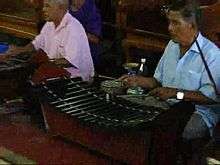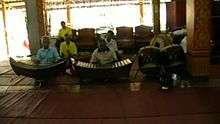Piphat


A piphat (Thai: ปี่พาทย์, pronounced [pìːpʰâːt]) is a kind of ensemble in the classical music of Thailand, which features wind and percussion instruments. It is considered the primary form of ensemble for the interpretation of the most sacred and "high-class" compositions of the Thai classical repertoire, including the Buddhist invocation entitled sathukan (Thai: สาธุการ) as well as the suites called phleng rueang. It is also used to accompany traditional Thai theatrical and dance forms including khon (Thai: โขน) (masked dance-drama), lakhon (classical dance), and shadow puppet theater.
Hard-mallet vs. soft-mallet
The most common form of piphat is called piphat mai khaeng (ปี่พาทย์ไม้แข็ง). This ensemble uses an oboe called pi (after which the piphat ensemble is named), in combination with xylophones, gong circles, and other percussion instruments, with the xylophones and gong circles using hard mallets, creating a very bright, loud sound. A quieter variety of pipat ensemble, called piphat mai nuam (ปี่พาทย์ไม้นวม), uses a vertical flute called khlui phiang o in place of the pi, and soft mallets are used in place of hard mallets. Because the piphat mai nuam produces a relatively soft, mellow sound, the large glawng thad drums are not used. Also, the ensemble may include saw u, to enhance its soft sound.
Types of piphat
The smallest piphat, called piphat khrueang ha, is composed of six instruments: pi nai (oboe); ranat ek (xylofhone; khong wong yai (gong circle); taphon or other Thai drums; glong thad, a set of two large barrel drums beaten with sticks; and ching (small cymbals). Often other small percussion instruments such as krap or chap are used.
A slightly larger piphat ensemble is called piphat khrueang khu, and consists of eight musical instruments. The other two instruments are the ranat thum (xylophone), which produces a deeper sound than the ranat ek, and khong wong lek, a gong circle that is higher in pitch than the khong wong yai.
The largest form of piphat ensemble is the piphat khrueang yai, which consists of ten musical instruments. Another ones are ranat ek lek and ranat thum lek; these are almost the same as their ancestors, the ranat ek and ranat thum, but they have keys made from metal instead of wood.
Piphat khrueang ha
Wong piphat khrueang ha (Thai: วงปี่พาทย์เครื่องห้า, Thai pronunciation: [woŋ pìːpʰâːt kʰrɯ̂əŋ hâː]) is an ensemble consisting of:
- 1 pi nai - bass oboe
- 1 taphon - secondary beat
- 1 ching - main beat
- 1 khong wong yai - bass gongs hanged in nearly-fulled circular track
- 2 glong thad - Thai tympani
- 1 ranat ek - treble xylophone
Piphat khrueang khu
Wong piphat khrueang khu (Thai: วงปี่พาทย์เครื่องคู่, Thai pronunciation: [woŋ pìːpʰâːt kʰrɯ̂əŋ kʰûː]) is developed from piphat khrueang ha, by arranging instruments in pairs of treble-bass. It consists of:
- 1 pi nai - bass oboe
- 1 pi nok - treble oboe
- 1 taphon - secondary timekeeper
- 1 glong songna or 2 glong khaek
- 2 glong thad - Thai tympani
- 1 ching - main timekeeper
- 1 chap
- 1 khong wong yai - bass gongs hung in semicircular track
- 1 khong wong lek - treble version of gongs hung in semicircular track
- 1 khong mong
- 1 ranat ek - treble xylophone
- 1 ranat thum - bass xylophone
Piphat khrueang yai
Wong piphat khrueang yai (Thai: วงปี่พาทย์เครื่องใหญ่, Thai pronunciation: [woŋ pìːpʰâːt kʰrɯ̂əŋ jàj]) is arranged by adding ranat ek lek (ระนาดเอกเหล็ก; treble metallophone) and ranat thum lek (ระนาดทุ้มเหล็ก; bass metallophone) to the wong piphat khrueang khu.
Piphat nang hong
Wong piphat nang hong (Thai: วงปี่พาทย์นางหงส์, Thai pronunciation: [woŋ pìːpʰâːt naːŋ hǒŋ]) is an ensemble used in funerals. It is arranged by replacing the pi nai and pi nok with a pi chawa. The name nang hong comes from name of its main music
Piphat duek dam ban
Wong piphat duek dam ban (Thai: วงปี่พาทย์ดึกดำบรรพ์, Thai pronunciation: [woŋ pìːpʰâːt dɯ̀k.dam.ban], literally "ancient ensemble") was proposed by Prince Naris for using in Thai opera. It consists of:
- 1 ranat ek
- 1 taphon
- 1 ranat thum
- 1 ranat thum lek
- 1 khong wong yai
- 1 ching
- 1 taphon - "tympani" made by using two taphons arranged together.
- 1 saw u
- 1 khlui u - bass flute
- 1 khlui phiang aw - medium
- 1 wong khong chai - a set of 7 khong chai with different size hung on wooden bar.
Piphat mon
_(3771128467).jpg)
The piphat mon is believed to derive from the Mon people, an ancient Mon-Khmer-speaking people of mainland Southeast Asia, and uses special instruments such as an upright gong circle called khong mon. Wong piphat mon (Thai: วงปี่พาทย์มอญ, Thai pronunciation: [woŋ pìːpʰâːt mɔːn]) has three sizes:
Piphat mon khrueang ha
Wong piphat mon khrueang ha (Thai: วงปี่พาทย์มอญเครื่องห้า, Thai pronunciation: [woŋ pìːpʰâːt mɔːn kʰrɯ̂əŋ hâː]) consists of:
- 1 ranat ek
- 1 pi mon - bass oboe with horn-shaped end.
- 1 khong mon wong yai - a set of bass gongs set in vertical frame (unlike khong wong yai, which gongs are set in horizontal semicircular frame).
- 1 poengmang khok (เปิงมางคอก) or khok poeng (คอกเปิง) - Mon drums set in cage-shaped frame.
- ching, chap and khong mong
Piphat mon khrueang khu
Wong piphat mon khrueang khu (Thai: วงปี่พาทย์มอญเครื่องคู่, Thai pronunciation: [woŋ pìːpʰâːt mɔːn kʰrɯ̂əŋ kʰûː]) is arranged by adding ranat thum and khong mon wong lek to the piphat mon khrueang ha.
Piphat mon khrueang yai
Wong piphat mon khrueang yai (Thai: วงปี่พาทย์มอญเครื่องใหญ่, Thai pronunciation: [woŋ pìːpʰâːt mɔːn kʰrɯ̂əŋ jàj]) is arranged by adding ranat ek lek and ranat thum lek to the piphat mon khrueang khu.
The piphat mon ensemble is usually used in funerals, as it generally plays slow pieces. However, it can also be used for other events.
The piphat ensemble can be mixed with the khrueang sai ensemble to create a new ensemble called khrueang sai prasom piphat (เครื่องสายประสมปี่พาทย์ or เครื่องสายผสมปี่พาทย์).
Similar ensembles
The Cambodian equivalent of the piphat is called pinpeat.
See also
References
- Piphat ensemble (Thai)
- Piphat nang hong (Thai)
- Piphat deuk dam ban (Thai)
- Further information about piphat ensemble (Thai)
External links
Listening
- Pi Phat Ensemble page from SEAsite
| ||||||||||||||||||||||||||||||||||||||||||||||||||
| ||||||||||||||||||||||
